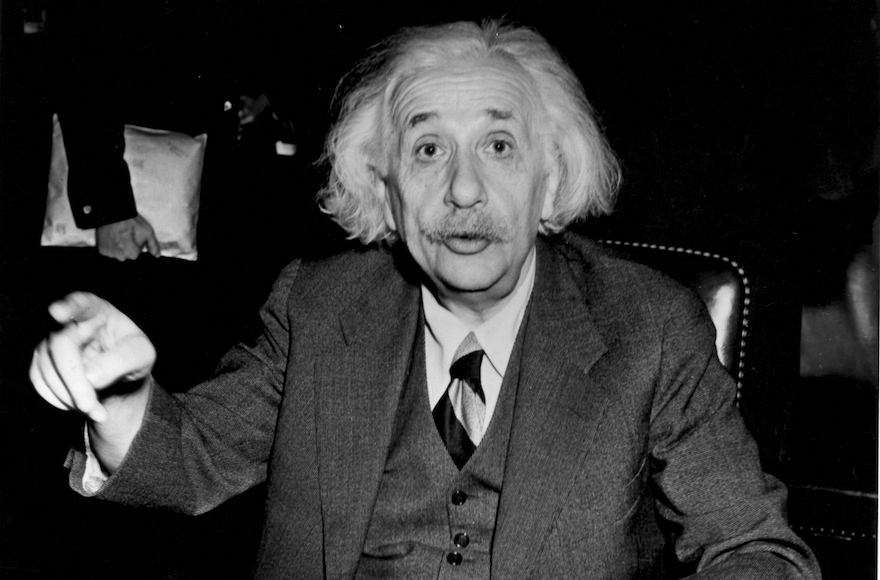Wednesday marks the centennial of Albert Einstein’s theory of relativity, a discovery that forever revolutionized the study of gravity, space and time. While Einstein’s genius was well established by 1915, the year the theory was published (he devised the famed E=mc2 equation 10 years earlier), the physicists’ relationship to Judaism and Zionism was still evolving.
Here are seven facts about Einstein on religion, World War II and Israel.
1. He kept kosher at age 12
Young Einstein went through an observant phase at 12, even though his parents were secular Ashkenazi German Jews. He didn’t stay interested in Judaism long enough to have a bar mitzvah though. A Jewish medical student and family friend — named, ironically enough, Max Talmud — introduced the creative boy to popular science books, which Einstein saw as contradicting religious teachings.
2. He raised money for the World Zionist Organization
In 1921, Einstein was asked by WZO president and fellow scientist Chaim Weizmann to raise money for the organization and for Hebrew University in Israel. Einstein had been worried the Zionist project could stoke Jewish-Arab conflict, but the anti-Semitism he faced in Europe, even as he published some of the world’s most important scientific work, convinced him of the need for a Jewish state. He agreed to take a fundraising tour of the United States in 1921, where he was greeted as a celebrity. He later gave the first-ever scientific lecture at Hebrew University, a school he helped conceptualize in 1923.
3. He visited Jews in Palestine, but never Israel
In 1922, on the way back from a trip to Asia, Einstein stopped for 12 days in what was then the British Mandate of Palestine. Although he was received like a visiting dignitary and told a crowd that he was proud of how Jews were becoming “a force in the world,” he never returned.
4. He was abroad when Hitler came to power and never went back to Germany
Einstein was staying at the California Institute of Technology in Pasadena, California, in February 1933 when Adolf Hitler was named the new chancellor of Germany. By the time Einstein and his wife, Elsa Einstein, got to Belgium on their way back to Germany in March, their German cottage had been raided by the Nazis. The physicist renounced his German citizenship at Belgium’s German consulate and went back to the U.S. He never again set foot in Germany.
5. He was asked to be the second president of Israel
When Chaim Weizmann, who served as Israel’s first president, died in 1952, Prime Minister David Ben-Gurion offered the office to Einstein, who hadn’t been to the Middle East in 30 years. Einstein declined with a heavy heart, saying:
“I am deeply moved by the offer from our State of Israel, and at once saddened and ashamed that I cannot accept it. All my life I have dealt with objective matters, hence I lack both the natural aptitude and the experience to deal properly with people and to exercise official functions … I am the more distressed over these circumstances because my relationship to the Jewish people has become my strongest human bond, ever since I became fully aware of our precarious situation among the nations of the world.”
6. He believed in a “pantheistic” god as described by Jewish philosopher Baruch Spinoza
Einstein openly commented on the relationship between science and religion throughout his life, but his personal beliefs would satisfy neither atheists nor the devoutly religious. He aligned his religious beliefs with those of Spinoza, a Dutch thinker who was excommunicated by the Amsterdam Jewish community in the 17th century for his “rationalist” philosophies. Einstein did not believe in the commonly accepted anthropomorphic conception of God. “I believe in Spinoza’s God who reveals himself in the harmony of all being, not in a God who concerns himself with the fate and actions of men,” he wrote to a rabbi in 1929.
7. He wrote a speech for Israel’s seventh Independence Day on his deathbed
In 1955, Einstein was scheduled to deliver a speech marking Israel’s seventh Independence Day on ABC, NBC and CBS. On April 17, nine days before the speech, he experienced internal bleeding that landed him in the hospital. He reportedly took a draft of the speech with him to the hospital, but he died the next day after refusing emergency surgery. The Israel State Archive published drafts of the speech in 2013.
“[T]he establishment of Israel is an event which actively engages the conscience of this generation,” Einstein wrote in the draft. “It is, therefore, a bitter paradox to find that a State which was destined to be a shelter for a martyred people is itself threatened by grave dangers to its own security. The universal conscience cannot be indifferent to such peril.”
8. He visited the JTA printing presses
Einstein was a known supporter of the Jewish Telegraphic Agency, which he helped raise money for in the 1930s and 1940s. In appealing for public support, he said the “Jewish Telegraphic Agency performs functions vital to [the] entire Jewish community,” and at one point he was photographed at the JTA printing press. In 2012, a series of letters between Einstein and JTA founder Jacob Landau (Einstein served as a godfather to his son) surfaced and were sold at a Sotheby’s auction.
JTA has documented Jewish history in real-time for over a century. Keep our journalism strong by joining us in supporting independent, award-winning reporting.






